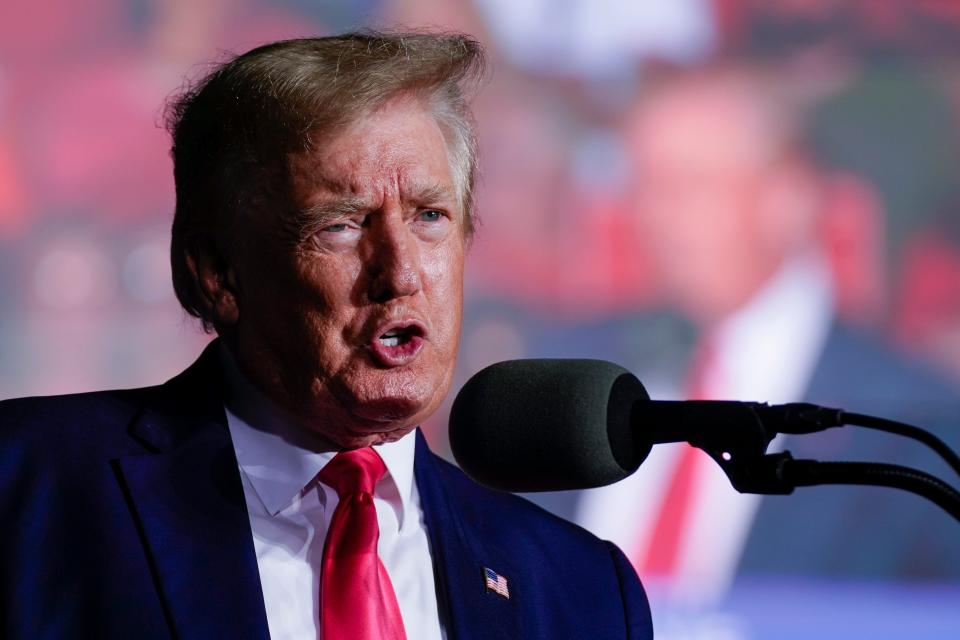Could Trump be barred from office if he's convicted of removing classified documents?
The FBI search of former President Donald Trump's Mar-a-Lago home on Monday raised new legal questions about Trump's political future.
A section of federal code says anyone determined to have improperly removed government documents would be disqualified from holding federal office. Trump's estate was searched in connection with a probe into whether he did just that when he left the White House.
In 2015, some Republicans wondered whether the law could be used to disqualify then-Democratic candidate Hillary Clinton from serving as president over her use of a private email server for official government business.
So, could Trump be barred from (again) pursuing a second term in the White House if he is convicted of violating the law? Experts are dubious, as they were in 2015.
The Constitution, not Congress, determines who can run for president, they say, and trying to apply the law to the presidency almost certainly would fail a legal challenge.
Watergate 'in reverse'?: Historians and legal analysts pan Trump's claims and point to legal peril ahead
What does the law say?
Twitter was abuzz on Monday night after Marc Elias, a Democratic attorney, tweeted Section 2071 of Title 18 of the U.S. code, saying it would be a "blockbuster in American politics" to see a presidential candidate litigate the matter.
Here is what that section of law and the U.S. Constitution have to say about qualifications for office.
Removing records: Under that section of federal law, anyone who has federal records and who "willfully and unlawfully conceals, removes, mutilates, obliterates, falsifies or destroys the same" is in violation of the law.
Penalties: Violating the law carries a potential fine and a maximum prison sentence of three years.
Holding office: The law also says anyone convicted under the law must forfeit office "and be disqualified from holding any office under the United States."
Constitutional question: The Constitution, though, lays out only three requirements for presidential candidates. They must be natural-born U.S. citizens, have lived in the U.S. for at least 14 years and be at least 35 years old.
Trump records investigation: From early red flags to the search at Mar-a-Lago

What do the experts think?
Even Elias immediately downplayed the likelihood of Trump being barred from the presidency, saying in a follow-up tweet that he recognized the "legal challenge that application of this law to a president would garner."
Legal experts told USA TODAY that while the law has yet to be litigated, it almost certainly wouldn't apply to the presidency. And it would take clearing some high hurdles – including the unprecedented trial and conviction of the former president – before it ever was a serious question.
Investigations: Trump in midst of gathering storm of investigations. Mar-a-Lago document inquiry is one of many.
“We’re going to see litigation all the way to the Supreme Court obviously if this becomes an issue in the 2024 election," said Neama Rahmani, a former federal prosecutor.
UCLA law professor Eugene Volokh said he was "pretty confident" the law would not hold up to a legal challenge over disqualifying Trump for the presidency.
Exclusive criteria: “I don’t think Trump can be disqualified by this law from being president. The reason is that the Supreme Court has essentially said the constitutional criteria for eligibility are the exclusive criteria," Volokh told USA Today.
SCOTUS decisions: Volokh cited another scholar in 2015, pointing to a pair of Supreme Court decisions that neither Congress nor states can add to the qualifications for seats in the House or Senate. Volokh said that would extend to the presidency and vice presidency as well.
George Washington University law professor Randall Eliason: “I don't know that we know for certain. I don’t think it’s been decided. But I think there’s a real doubt that the disqualification provision would apply to the office of the presidency.”
This article originally appeared on USA TODAY: Could Trump be barred from office if convicted in records probe?

 Yahoo Movies
Yahoo Movies 
